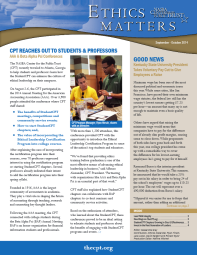Leadership Column: Why Our Work is So Important (Sept/Oct 2014)
Ethics Matters
September/October 2014
 Recently, BusinessWeek posted an article on its website titled: Business Schools Aren’t Producing Ethical Graduates. After reading the article, I was saddened and excited at the same time. I am saddened by many of the truths in the article. However, I am excited about the work we do at the NASBA Center for the Public Trust (CPT), and how we are being a difference for many students graduating from business schools across the country.
Recently, BusinessWeek posted an article on its website titled: Business Schools Aren’t Producing Ethical Graduates. After reading the article, I was saddened and excited at the same time. I am saddened by many of the truths in the article. However, I am excited about the work we do at the NASBA Center for the Public Trust (CPT), and how we are being a difference for many students graduating from business schools across the country.
The article contends that the teaching in the classroom is no match for the pressure young professionals face in the global marketplace. The article focuses much of its attention on international business, which is definitely concerning. However, many ethical challenges also exist within the domestic business environment.
The article does a good job making the case that students need experiential learning to understand and feel the pressure that makes good people make bad decisions. With such experiences, students can develop skills that will help them overcome ethical challenges in their careers.
Through our StudentCPT chapters and other activities, we give students creative ways to experience ethical dilemmas before they enter the workforce. Our chapter meetings take on three forms:
- Live case studies and debates concerning current ethical issues,
- Interactive discussions with corporate executives who have first-hand experience with fraud or ethical dilemmas, and
- Strategic networking events where students have more focused interactions and learning opportunities with experienced business leaders.
In the live case studies and debates, students are challenged to take on the actual roles of the real-life individuals in the ethics cases. This approach is critical to the students’ development, because it simulates for them the emotions and justifications made by the parties involved in each case. Through this experience, students test their decision-making processes and decision quality as part of the whole learning experience.
When students get the opportunity to interact with the actual people involved in ethics cases, the learning experience also increases their ability to effectively handle issues they will face in their careers. For this reason, we bring in speakers to have interactive discussions with StudentCPT members at chapter meetings. Learning from others’ mistakes and successes, directly, is extremely beneficial to business school students. Students at our chapters consistently express key lessons learned from the presenters, because they also learn how to navigate away from negative ethical issues.
One of the best ways to avoid ethical failings is to have a strong network of advisors and mentors. Through our StudentCPT chapters we encourage networking events that include business leaders’ participation. These events create an opportunity for students to establish relationships with experienced leaders. These relationships often grow into advising and mentoring relationships. They also provide students exposure to companies and potential hiring opportunities. Business leaders enjoy the refreshing interaction with students, and they see the events as chances to get exposure to talented future leaders interested in ethics.
My argument is not whether business schools are doing enough or not. I am not comfortable making a statement that global. However, I am confident the work we do to supplement what the business schools do is very important to the future business leaders in America and the world.
In addition to the StudentCPT chapters, the CPT offers a national video competition for college students, a student leadership conference and an ethical leadership certification program for college students.
Take a look around this website for more information about what we do, or please visit the StudentCPT website.
— As Always, Lead With Integrity!
Alfonzo Alexander
President, CPT
CRO, NASBA




